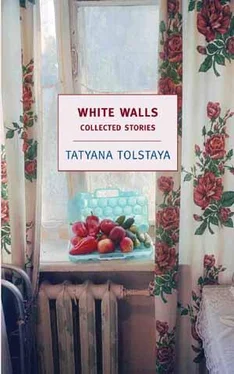“No!”
“These was a pack of thieves, deary. That’s what they was. They’d take him along in that suitcase, give him to someone in line to hold on to, and from inside there he hears everything— who’s got bonds hidden where, or lengths of cloth.”
“So that’s what they do!”
Horrified, I ask:
“The head, who was it?”
“Who, who, what’s it to you? You go play…. That what’s-her-name of yours—she still here? The one with the beads?”
Marfa doesn’t like Zhenechka: she doesn’t like her shabby coat, her beads, her nose—
“What a nose—a regular hose! If I had me a horn like that, I’d toot it on holidays! Such a laaa-dy! The same old gab all the time—yackety yackety yak…”
Marfa laughs, the elevator lady also laughs, politely, into her hand, and I laugh along with them, betraying poor unsuspecting Zhenechka, may she forgive me! But it’s true, she does go on—yackety, yackety…
“And I heard another,” Marfa starts.
But there’s already a deep blue beyond the windows, and there are voices in the foyer—Zhenechka is getting ready to go home. Exhausted, everyone rushes to kiss her, a bit ashamed that they were so blatantly bored and Zhenechka, a pure soul, didn’t notice anything amiss.
And someone walks her to the tram while the rest watch out the window: under softly falling snow, leaning on her staff, in her tall hat, Zhenechka slowly shuffles away, back to her lonely dwelling.
And the tram will rush past wastelands, snowdrifts, fences, past low brick factories that send a roaring appeal into the steely winter murk, past buildings decimated by the war. And somewhere at the edge of town, where the cold fields begin, a wizened amputee tumbles into the dim, clanking car, stretches out his accordion, and sings, “Oh, woe is me, a poor old cripple, I’m only half a man, they think; if you don’t help, my cares will triple, for I still need to eat and drink,” and warm, shame-ridden coppers fly into his filthy hat.
The snowflakes are thicker, the white shroud denser, the streetlamp sways, seeing off the small, lame figure, the snowstorm sweeps away the faint, barely visible footsteps.
But she was actually young once! Just think—the sky above was not a whit paler than it is now, and the very same velvety black butterflies fluttered above the splendid rose beds, and the whistle of the grass under Zhenechka’s cloth shoes was just as silky when she walked down the drive, canvas suitcase in hand, to her first pupil, the mute, dark-eyed boy.
His parents were good-looking and rich, of course; they had an estate, and the estate had a greenhouse with peach trees, and young Evgeniya Ivanovna, who had just finished school with honors, was photographed among the peach blossoms— homely, smiling pleasantly, with two long, fluffy braids remarkable for the fact that they grew thicker and fluffier at the bottom. The picture faded to an iodine yellow, but Zhenechka’s smile and the peach blossoms still showed, while her mute charge had bleached away entirely—all we could see was a bright patch nestled up against Zhenechka.
When she came to that long-ago family, the boy could speak only his name: Buba. The rest of the world was engulfed in his silence, although he heard everything and loved everyone, and must have come to love Zhenechka especially, for he often sat close by her, gazed at her with his dark eyes, and stroked her face with his little palms.
It was enough to move a person to tears, and the rich parents wept, blowing their noses into lacy handkerchiefs, while the bearded family doctor, whom they paid exorbitant sums to examine Buba, gave his indulgent approval to the new governess, though he didn’t find her pretty. But Zhenechka wasn’t touched and she didn’t weep. All business, she immediately established a daily routine and never deviated from it in all the years that she lived with her charge. After a while, to the amazement of the parents and the envy of the bearded doctor, the boy began to talk—quietly and slowly, glancing at serious, attentive Zhenechka, forgetting by morning the words that he had learned the night before, mixing up his letters and losing his way in the maelstrom of sentences, but, still and all, he did begin to talk, and could even draw some scribbles. The letter izhitsa came out best—the least used, most unnecessary letter in the Russian alphabet.
On Zhenechka’s instructions the rich parents bought dozens of lotto games, and mornings she would wake to a knock at the door; the boy was already waiting for her, holding under his arm a rattling box full of little cardboard squares covered with elusive, difficult, slippery black words: ball, bird, hoopstick.
Once she took a vacation and paid a visit to her Petersburg sisters—she was not destined to see the fourth, the most beloved one, in far-off Helsingfors. Called back to the peach estate by an urgent telegram, she found the rich parents sobbing, the bearded doctor tranquilly triumphant, and the boy silent. The flimsy film of words had washed from his memory during Zhenechka’s absence; the enormous rumbling world, fearsome and noisy, had reared up in menace and crashed down on him in all its nameless inarticulateness, and only when Zhenechka hurriedly unpacked her canvas bag and retrieved the bright ball she’d bought him did the boy cry out in recognition, gasping: “Moon, moon!”
They wouldn’t let Zhenechka go off again; now her Petersburg sisters had to come to her. But her favorite sister somehow couldn’t manage to get away from Helsingfors for a visit. And she never did.
There was some fear that Zhenechka would marry and abandon the peach family—a needless fear: her youth fluttered by and departed without attracting anyone’s attention. There must have been men Zhenechka liked, who appeared and disappeared in her life, just as, if you turn a kaleidoscope for a long time, a rare, yellow shard of glass will occasionally tumble free and bloom like a broken star. But not one of them asked more of Zhenechka than true, steady friendship; there was no one whose eyes misted over at the thought of Zhenechka, and no one who made a secret of his acquaintance with her—such a pure, respectable, ennobling acquaintance. Zhenechka is an extraordinarily good person, someone would say, and everyone else would ardently take up the cry: Oh, yes, wonderful! Simply unique! So honest. And decent. Uncommonly conscientious. A crystal-pure soul!
There was one short, stunted, meager love in Zhenechka’s life; there was someone who troubled Zhenechka’s clear soul—perhaps for a week, perhaps for her whole life; we never asked. But whenever she told the story of how she lived and whom she taught before the war, one episode trembled plaintively through the years; there was one episode she always faltered over, and her high, calm voice would suddenly break for a moment, always on the very same phrase: “Good tea, Evgeniya Ivanovna. It’s hot.” That’s what someone said to her at three o’clock on one prewar February afternoon, in a warm wooden building. At the time, Zhenechka was teaching Russian in a quiet sewing school, vegetating amid the apple trees and kitchen gardens somewhere on the outskirts of the city. Tearing themselves away from the subtleties of constructing “Under-garments, Women’s Winter” and bolero jackets, uncounted generations of young seamstresses plunged into the refreshing, well-ordered streams of Russian grammar, only to forget forever the blur of Zhenechka’s face after leaving their alma mater. They scattered around the world, loving, giving birth, stitching, pressing; they sang, saw husbands off to war, cried, grew old, and died. But, resolutely taught by Zhenechka, even on their conjugal beds they remembered the correct spelling of negative prefixes, and on their deathbeds, in a mortal swoon, they could, if necessary, have parsed a sentence.
Читать дальше












